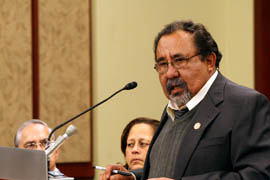Advocates reach out to older Hispanics as health law takes effect

 By Kirsten Adams
By Kirsten Adams
Cronkite News
Those with group health insurance
1. Premium increase of 10 percent or more must be justified.
2. Coverage can’t be dropped if you get sick now.
3. More free preventive services are offered: mammograms, immunizations and cancer/diabetes screenings.
Those who buy their own coverage
1. Adult children can remain on family policies until age 26.
2. Pre-existing conditions insurance plans are available.
3. Health insurance exchange plans will be offered beginning Jan. 1.
Those with Medicare
1. Free annual wellness visits are added.
2. Coverage is expanded for preventive care to mammograms, colonoscopies and certain cancer/diabetes screenings.
3. Medicare is strengthened to extend the program’s financial stability for another decade.
Source: AARP Arizona
PHOENIX – With the health insurance marketplace created by the federal Affordable Care Act set to open in October, advocates are out to make sure that the message reaches Arizonans who are older or Spanish-speaking.
“That’s the population that’s the most vulnerable,” said U.S. Rep. Raul Grijalva, D-Tucson. “It’s an opportunity to get health care not on a hit-and-miss basis, but on a consistent basis.”
Grijalva, who has held several town halls on health care reform, said this kind of outreach is important for groups that are more likely to be uninsured or underinsured and to have difficulty navigating the process.
“It’s not enough to put a radio advertisement in, and doing it over the Web is not going to reach this population,” he said.
AARP Arizona has visited Univision and Telemundo shows and has run radio ads in Nogales, Tucson, Phoenix and Yuma. Volunteers have held Hispanic 50-plus conferences at senior centers and libraries around the state.
“We’re just now gearing up to start the effort,” said David Parra, AARP Arizona director of community outreach.
He said community leaders need to inform those who might use the insurance marketplace because many Arizonans only know the very basics.
“These are totally new concepts, but we can’t expect something this huge to be simple,” Parra said.
Herb Schultz, regional director for the U.S. Department of Health and Human Services, attended one of Grijalva’s town halls and said state organizations, such as local health centers and nonprofits, are “paramount” to informing citizens of the changes.
“We know not everyone has access to the Internet, so there have been significant dollars provided under the act to expand services for community health centers – a prime and very key way in rural areas and for aging Americans and seniors to be able to get their health care,” Schultz said.
Avein Tafoya, CEO of Adelante Healthcare, a nonprofit with community health centers serving rural areas and the working poor, said the most effective way to make a policy change understood and effective is “for it to become a part of the community’s social fabric.”
“Even for the educated, even for those who are insured and have means, the Affordable Care Act is extremely complicated,” said Tafoya, who joined Grijalva at a town hall. “It’s our duty as a community health center to be a place where we can share what we know, where we can help community members navigate the system and feel better prepared.”
Adriana Perez, a congressional health and aging policy fellow and assistant professor at Arizona State University’s College of Nursing and Health Innovation, said smaller events in “grassroots settings” have appealed more to older or Spanish-speaking people.
“This community is unique because Spanish-speaking residents may feel some hostility or trust issues with federal services,” she said. “Leaders in communities will need to be the resource for residents, and education (on the act) needs to fit within their lifestyles.”
Perez said health centers and organizations are getting down to implementing the act, and nonprofits are now starting to prepare information in multiple languages.
“This is where the rubber meets the road,” she said.
Grijalva said any obstacles that come up in keeping citizens informed of the act need to be handled quickly.
“People do want health care, and when they have the opportunity to make an informed choice they’re going to make it,” he said. “The success will be that we get the uninsured insured.”














